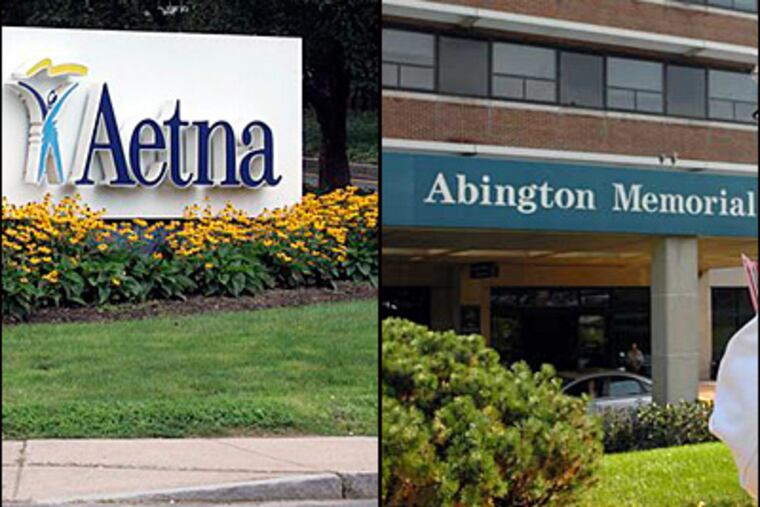Abington medical dispute highlights wide friction with insurers
Up to 10,000 Aetna subscribers are caught in the middle of a contract fight between the insurance company and a 19-member cardiology group that says it provides most of the heart care at Abington Memorial Hospital.

Up to 10,000 Aetna subscribers are caught in the middle of a contract fight between the insurance company and a 19-member cardiology group that says it provides most of the heart care at Abington Memorial Hospital.
Negotiation battles between hospitals or doctors and insurers that go down to the wire - and beyond it - have become more common in recent years as insurance companies have faced more pressure from subscribers and employers to curb costs.
The contract between Aetna and Abington Medical Specialists (AMS) expired Jan. 1. Patients can continue to see the doctors but are no longer covered in-network by Aetna. That leaves them with the choice of paying higher prices or finding new doctors.
Adam Cohen, a doctor at the practice, which has 17 cardiologists and two internists, said the dispute was about reimbursement. He said the group had not had a raise since 2006 and was paid well below national average rates. While Aetna has agreed to pay more, he said, their offer is well below what the doctors seek.
"They really exhibited no willingness to negotiate in earnest," he said.
Aetna said it has a responsibility to save money for its customers. Its offer, said spokesman Walt Cherniak, reflects "medical trend" in the area and what other cardiology groups are being paid. The cardiologists' demands, he said, "have been unrealistic." Cherniak said Aetna wants to keep the group in its network.
Independence Blue Cross, the region's other major private insurer, had disputes last year that left two significant urology groups out of its network. Premier Urology Associates, which has eight doctors in Langhorne, left IBC in July after the company cut its rates, said Ravi Rajan, a doctor in the practice. IBC and Academic Urology, which has 48 doctors in multiple locations, terminated their contract Nov. 30. According to IBC, Academic served 12,300 of its members.
Bernie Lynch, senior director of payer relations for the Pennsylvania Medical Society, said that it was still rare for doctors to drop their contracts with insurers in Pennsylvania, but they had become more careful about signing anew. "They've become more astute about what's included and what the fee base is and how it's going to affect the practice," he said.
Alan Zuckerman, president of Health Strategies & Solutions in Philadelphia, said more physicians had been leaving insurers' networks as insurers tried to freeze rates. "We're seeing a noticeable uptick of it nationally where physicians feel that they are not getting contracts that are acceptable," he said. "It doesn't usually last for very long because the reality is that the physicians generally can't function without a contract from an important payer."
Doctors, particularly those in small groups, are in a tough bargaining position, he said. Many feel they have little choice but to accept what insurers dictate. "It's not about being fair," he said. "It's a business deal."
After three years of tough economic times, he said, "doctors have to share the pain."
The economic pressures are leading many doctors to merge with other groups or become hospital employees.
AMS's Cohen said Aetna had been doing well enough financially to pay his group more. The company had operating earnings of half a billion dollars in its third quarter last year. Ronald Williams, who retired as Aetna chief executive officer in 2010, received $18 million in compensation that year, exercised stock options worth more than $50 million and got a pension valued at more than $9 million.
"What we pay our CEO is not related to what we pay cardiologists in Montgomery County, Pennsylvania," Cherniak said.
Cohen said the doctors want a contract that brings Aetna, which pays them less than Medicare or Independence Blue Cross, more in line with other insurers and national averages. They originally asked for a 27 percent increase in the first year and have now come down to an 18 percent raise spread out so that it results in a 14 percent increase that year, followed by a 6 percent raise the next year, and 3.5 percent the year after.
Aetna originally offered a three-year contract with increases of 3 percent each year. Cohen said they are now offering annual increases of 4 percent, 3.5 percent, and 3.5 percent.
Cohen said that the impasse had created a "major access-to-care issue" for Aetna patients in Montgomery and Bucks Counties.
Cohen's group cares for 85 percent to 90 percent of cardiology patients at Abington Memorial Hospital. In a written statement, Laurence M. Merlis, president and CEO of the hospital's health system, Abington Health, said: "In the best interest of our valued patients and employees, we sincerely hope that AMS and Aetna can come to an agreement very soon. We are encouraging both sides to continue active discussions for a quick resolution."